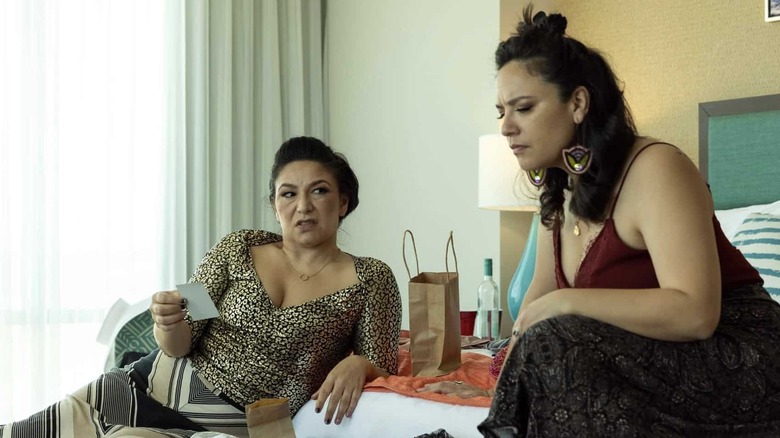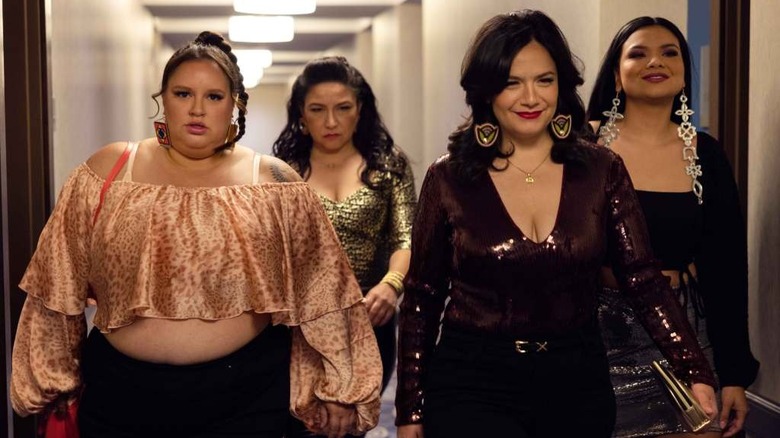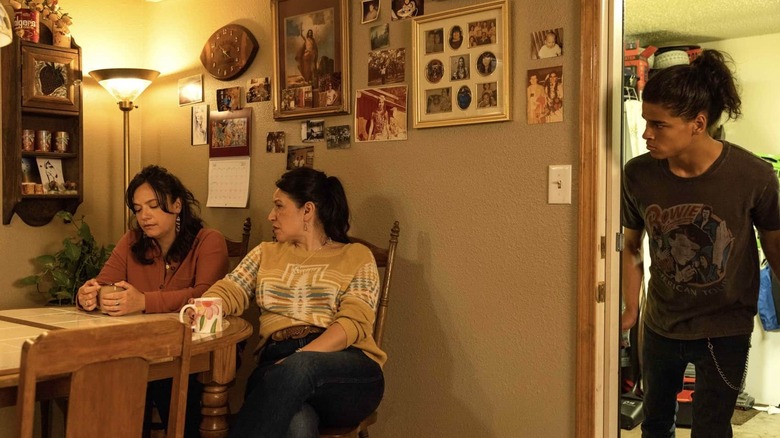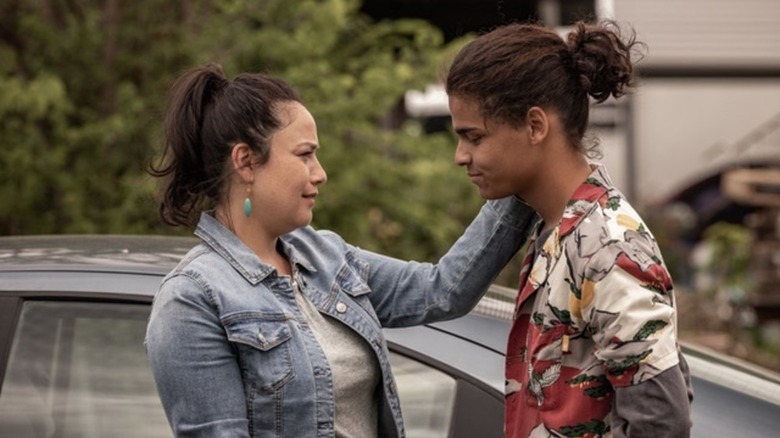
"Reservation Dogs" isn't a show that can be put in a box. There's no ceiling to the creativity. It can go to many places and explore many emotions, but actor Sarah Podemski sums it up rather well when she says co-creator Sterlin Harjo's work is a "conversation." He's making a show people not only want to watch, but also talk about, which is a hard TV series to find in a world of "content."
Harjo and all involved aren't making "content," though. They're telling stories that need to be told. One of Podemski and Harjo's previous collaborations, "Mekko," even tackles similar themes and questions found in the riveting FX series. The freshman season set a high bar, but Podemski believes season 2 surpasses it.
Recently, the actress, who also stars in "Resident Alien," talked to us about the joys of making the second season, the groundbreaking episode "Wide Net," and what the show means to her.
'It Felt Like Such A Triumph'

"Wide Net" is such a great episode. It's loaded with feeling. How was it reading it on the page?
It was so great reading that episode. We were like, this is brilliant. How is this going to translate? And to see it all come together, it was so beautiful. It felt like such a triumph. Just a triumph for women, I think, for Native women to see themselves represented in that way for the first time. Our sense of humor and our love for one another, and our love for our kids and our community, but also the exhaustion. There's a really nice narrative there that I don't think we really get to explore.
I'm Jewish on my father's side and I'm Anasazi on my mom's side. But the funny thing is, that humor is huge in both of my cultures. You have to laugh through the trauma. In one moment you're talking about something very traumatic, but then you make a joke about it to understand it better and to be able to cope with it. So it's nice that we're finally getting to see that through a Native lens, because I think everything has been very serious and trauma based for a really long time from people's perspective. But I do love that about the show where we get to see serious subject matter and then them joking about it and being ridiculous all in 30 seconds.
A special ending, too. Just beautiful seeing two friends in bed, having a nice time.
It was so beautiful, and Tazbah Chavez wrote and directed that episode. It's just a lived experience of being single and wanting to snag and everything, but at the end of the day, you want to be with someone who makes you feel good and safe. And in that moment, that was Teenie. There's probably people rooting for Rita to get with the doctor, but it felt so much more real life that you would end up in bed with Teenie watching a sh*tty movie and then puking her guts out while Teenie held her hair. Yeah, that seems realistic.
That is true friendship.
Yeah, exactly. Sisterhood.
As a viewer, it's just nice to see a story go to the unexpected and land on a poignant note, but as an actor, I can't imagine how great that feels to play.
First word that comes to my mind is it's a relief, because it comes so naturally. I think that's what you want, you want to feel natural. When I'm performing, I want it to feel natural. I want people to feel relaxed while they're watching it, to believe in this world and to believe in these characters. So when you get a script that has everything in, it's a relief.
It's not that I don't have to do the work, but I don't have to do the work of reaching or trying to find something that makes sense, or trying to find some lived experience. You're reading something that is so natural that it's not that far to be like, oh yes, I know this feeling. It's very accessible.
You've said before whenever you're doing a role, you try to show the human experience of what's happened with a character in the best way you can play it. For season two for Rita, how is that different?
Well, it really helped having my sister [Tamara] there playing the role of Teenie, because we have this history of being sisters. There are the ups and the downs and the fights and the reuniting, and the fights through a loving relationship, and all the dynamics and nuanced things that happen in a real life relationship.
The two episodes back to back... Not the funeral, but the gathering for Laura's grandmother and then the girls night after, it had this through-line of reconnection for Rita. And being able to have Tamara there and have that lived experience with her to settle into a very familiar dynamic was really helpful, because those were two big episodes for Rita emotionally. I had the support to be able to move through those new emotions.
In the first season we didn't really get to go that deep with Rita. This season I was able to be surrounded by other actors to work with that made that transition really simple and really accessible for that experience. But yeah, I really trusted even working with D'Pharaoh for the first few episodes, just that familiarity of having that dynamic from the first scene for the first season. It was nice to return to it and rely on that we knew each other and we trust each other.
I'd say a lot of trust with the other actors was really helpful this season. And knowing that we had accomplished what we set out to do, there was a confidence in that. So there was just a different energy for me I think in the second season, being able to really lean into Rita and go to places that I wasn't able to go in the first scene, and really explore her in a deep way.
'That Was The Episode That Really Stood Out To Me Where I Kept Pausing And Being Like, Holy F***'

Even though we didn't see as much of Rita in season one, there are some great moments in season one that did say a lot. One of the best was her talking to Bear in the car, just being honest with her son.
Yeah. Well, I grew up with divorced parents, and that was a feeling that I knew, the disappointment and the sadness. And obviously there were lots of happy times, but there are those moments where that's true. I was able to access those emotions from the child's perspective, not necessarily from being the mother, but the sadness and the disappointment of experiencing that.
The beautiful thing about the show is that everyone in the writer's room has had a similar experience. So when we come together and we're like, yes, we know this moment, it just gives us a way to authentically show it and portray it, which is why I think people resonate so much with the show. Because these are real moments that the writers really know. We all know these experiences and most of us have experienced it in one way or another. So it just gives this real honest telling of these characters' lives
I think a lot of people could watch that scene, and they remember either having that moment with a parent, or they never had it and wish they did.
Yeah, that's interesting. It's almost like it gives the viewer a chance to, I don't know, work through their own trauma. That's good. I never really thought about that in that way. I'm glad it resonated with you though. I think that's the best part of it, hearing when people say, "Oh my gosh, I knew that moment, or I felt that way." That's really important.
I imagine a great thing about being on the show, especially as a supporting cast member, you can enjoy some episodes completely as a viewer. Are there moments in season two that, maybe you aren't in, but really resonated with you?
You know what's interesting, I try not to read too much press about the show and how people are perceiving certain things from the show. But we watched... See, now I'm terrible. I think it was episode two where Laura and Jackie get picked up by the guy and then they stab him in the shoulder.
[Laughs] Josh Fadem.
[Laughs] Yeah. Oh, my God. He was just so brilliant. But that whole episode that there are... One is that they get picked up by the guy and it goes to a sinister place, and then they get chased while they're running through the field by those guys in the pickup truck. And as I'm watching I'm thinking, oh my gosh, this parallels so many stories of our young women. One is that they're targeted and hunted and go missing, and are murdered at rates that are way higher than any other demographic of women. And then the stealing of the property, which happens all the time.
We had a very famous case in Canada with Colten Boushie, who was shot and killed by a farmer while he and his friends were trying to steal a car on the property. And that episode mirrored both two really intense experiences that could have gone the wrong way, but let them escape. So it was those moments I watched and I'm like, wow, I cannot believe that the writers and the directors were able to accomplish that.
The younger actors, the young ones, were able to perform these traumatic triggering scenes that do happen in real life in our community all the time. Just to watch that as a viewer and to be brought into that world feels surreal, this show accomplishes these issues on so many different levels. That was the episode that really stood out to me where I kept pausing and being like, holy f***, I can't believe they did this. I can't believe they put this in and I can't believe they made Elora and Jackie go through that. It's amazing to be able to be, as a viewer, so involved in a story and I forget that I'm in the show. It's amazing.
'They Are Always Going To Be Your Baby'

Like you said, the world can feel surreal at times. The show does have a tone of its own. For you, do you just always play it as real as possible or do you consider the surreal aspects when acting?
I always just think about being real, even if I were doing a completely different sci-fi thing. For me, my instinct is always just to go to a very real authentic place, so that even in the absurdity there's still a true reaction. I see what their director is doing while we're working, but in editing things can change. With music and with all the beautiful things all the other beautiful artists do after we're done filming our scenes, it can go in so many directions once I'm done doing the job of actor.
What I always do is try not to play the humor or an overly emotional moment. It just has to be real, be true. Whatever happens after, it can go in any direction. I've seen even in this show, things that I didn't think that were funny that I wasn't playing funny, and I was just playing them real, they come off as funny or sad. I think that's my approach, just always go to a real place and then all the other things that happen after in post-production can help that thing. It all marries together I find when you're coming from honesty.
For you, what are the little things that make Rita and Bear's relationship feel as real as it does?
One thing I like to do is touch and physicality, and just make sure that part is real. It's how my mother is with me and how I've seen how parents are, and even just how my father was with me. I find sometimes, especially now with that physicality, you have to ask people's permission. Are you comfortable with this? All of that. There was something that we shot in one of the later episodes where I'm holding his hand, just that physicality with him is that he's still my baby boy. Always having that, even if it's a look.
I don't have children, I'm an auntie. I've spent a lot of time with children. And it's that feeling of this kid, no matter how old they are, they are always going to be your baby. I think that whatever scene we're doing, even though he's a man and he's growing up, I want it to come across that he's always going to be my baby.
I like how you described Rita's softness as strength in an interview. Some people associate "strong" with the more conventional qualities, but it comes across that that kindness is a part of what makes her a strong character.
Yeah. I feel like that. I'm very feisty. Obviously, being in this industry comes with a lot of conflict, especially being native. I think I'm a real fighter. I'm a real fighter and I can get really angry at certain dynamics culturally in this industry, in real life, politically, all these things. I think I hold both of those things. I hold a lot of love and hope and generosity, but I also have a lot of sadness and anger and resentment to the way that things go for communities, and being a woman, being an indigenous woman, being a Jewish woman. I think that's just a very real feeling for a lot of people. You can have that love and you can have that hope, but then you can also carry a lot of anger and sadness and trauma. And so, I think that's something I just try and bring.
Even as a person, you want to be honest, even if it's through social media. It's like, you want to know that sh*t isn't perfect. I'm like, yeah, I'm in these shows and this is great and everything, but there's also real life. I think people want to see that. They want to see themselves represented through the media. I feel a really dynamic character like that is just real. It's real to have that harshness and that strict parenting, but also be full of a lot of love and compassion.
If you don't mind me asking, talking about those times of sadness and trauma, how do you hold onto that hope?
Oh, I really just believe, especially now, that we're here on this earth to love. Creator put us here to just prove that through all of it we can still love each other and take care of each other. I think in a lot of cultures, you can take certain things from the books. People take what they want from religion and stuff like that. But a lot of it also is about compassion and forgiveness and community. I really think that's the only thing I can do at the end of the day.
I do experience so much joy. I do know that I grew up with a lot of singing and dancing. I come from Jewish summer camp, and songs and dance, theater and play. And then also I grew up going to powwow and ceremony. You see that when we're in a community together with each other, and we're laughing and singing and dancing and being joyous, that trumps everything. I just really hold onto that feeling when sh*t hits the fan. Just remember there's so much joy to be had amongst all the garbage.
Well said. Also, speaking of your different creative backgrounds, I think that's a part of why the show is great. It's made by artists both inside and outside filmmaking. There's a variety of artistic influences there.
I'm so happy that it comes across. Because especially in the Native community, we are all so many different things. When you meet somebody, they're an artist in so many ways. They're either a beater or also a singer, or they're a dancer, or they're part of their community when they're doing ceremony. There's all these creative things and we're very multifaceted. And so, it's great that you can feel that from the show because everybody involved does multiple things. They're artists in so many ways. I think that makes us such a dynamic, vibrant community. We've been brought up with knowing that being artistic and being creative is something that is so integral to our existence.
"Reservation Dogs" season 2 is now available to stream on Hulu.
Read this next: The 13 Best Comedy Shows On Amazon Prime Right Now
The post Sarah Podemski Shares The Triumphs of Reservation Dogs Season 2 [Exclusive Interview] appeared first on /Film.
0 Comments